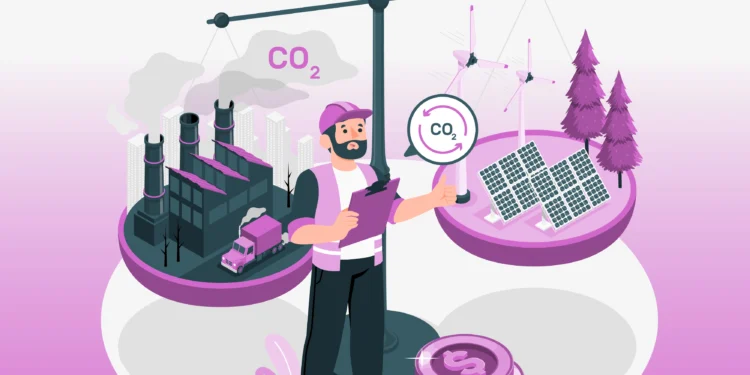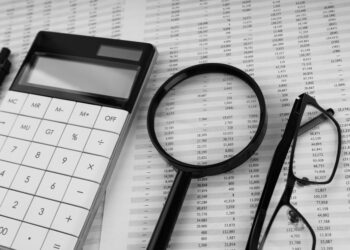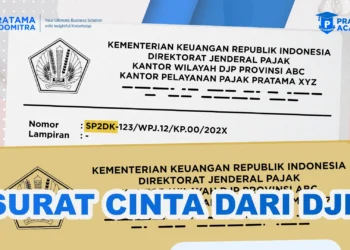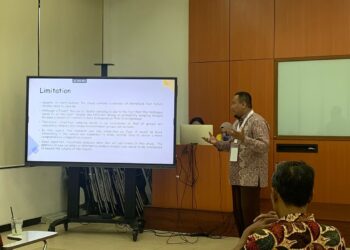Indonesia is one of the countries affected by climate change, which is caused by the increasing volume of carbon emissions along with the increase in industrial volume. Some impacts that can be felt directly include water scarcity and damage to land and ocean ecosystems.
According to the Emission Database for Global Atmospheric Research (EDGAR), in 2020, Indonesia was ranked 10th as a country producing carbon emissions. Long before that, the Government of the Republic of Indonesia had committed to facing the impacts of global climate change through the Paris Agreement (2015) by targeting Indonesia’s net zero emissions by 2050.
Therefore, the government is trying to realize low-carbon development by implementing a carbon tax to reduce negative externalities resulting from economic activities, which produce carbon emissions. Carbon emissions are the main cause of world climate change.
Carbon emissions, which are often defined as greenhouse gases (GHG), are the output of human activities. The carbon emissions referred to are equivalent carbon dioxide emissions, namely a representation of greenhouse gas emissions including carbon dioxide (CO2), nitrous oxide (N2O), and methane (CH4).
The Government has even issued Law Number 7 of 2021 concerning Harmonization of Tax Regulations (UU 7/2021 HPP) to regulate the imposition of a carbon tax. The law explains that a carbon tax is imposed on carbon emissions that have a negative impact on the environment.
In Law 7/2021 HPP, it is explained that the purpose of imposing a carbon tax is to control GHG emissions and support efforts to achieve the Nationally Determined Contribution (“NDC”) or nationally determined contributions, namely the national commitment to handling global climate change to achieve the goal. Paris Agreement (2015).
By definition, a carbon tax is a form of Pigouvian tax that compensates for negative externalities resulting from carbon emission activities. In this case, an industry produces fuel waste in its production activities.
What is meant by Pigovian Tax is a tax levy on each unit of output from a polluting source in an amount proportional to the marginal damage effect caused.
Pigovian tax is imposed on transactions that result in costs or losses that must be borne by third parties who are not actually involved in the transaction. This phenomenon is known as negative externalities.
The by-product of economic business activities is the release of carbon emissions into the air. Because the results of an industry’s production activities produce negative externalities in the form of carbon emissions that pollute the air, the industry must compensate for environmental losses in the form of paying taxes, in this case, the government.
Judging from taxation terms, a carbon tax is an instrument for the government to realize carbon emission targets. This is clear as stated in the 2015 Paris Agreement on the United Nations Framework Convention on Climate Change.
In Law 7/2021 HPP, it is stated that the subject of a carbon tax is an individual or entity that purchases goods containing carbon and/or carries out activities that produce carbon emissions. The carbon tax is payable on purchases of goods containing carbon or activities that produce a certain amount of carbon emissions in a certain period.
In 2022, the government will implement a limited carbon tax on coal-fired power plants at a rate of IDR 30,000/tCO2e. The carbon tax rate will be evaluated periodically and set at a higher or equal to the carbon price in the carbon market. However, in 2025, the government will expand the carbon tax management sector in stages according to the readiness of the business sector. Furthermore, the implementation of the carbon tax will be aligned with the carbon trading mechanism. This is done in order to create a sustainable carbon market.
Viewed in economic terms, a carbon tax is an instrument of the Economic Value of Carbon (carbon pricing). Thus, this policy is one part of a comprehensive policy package to mitigate climate change. The implementation of a carbon tax is aimed at changing industrial behavior to shift to green economic activities with low carbon emissions. The carbon tax also supports GHG emission reduction targets in the medium and long term. Furthermore, a carbon tax even encourages the development of carbon markets, technological innovation, and investments that are more efficient, low-carbon, and environmentally friendly.
The carbon tax is meticulously designed to adhere to the principles of fairness, affordability, and gradualness. It is important to note that the carbon tax policy is not a standalone measure, but a comprehensive policy package aimed at emission reduction and stimulating the transition to a sustainable economy. This approach ensures that the burden of the tax is distributed equitably and that the transition to a low-carbon economy is manageable for all sectors.
If the government successfully implements the carbon tax in line with its principles, the tax revenues from the energy sector are projected to reach IDR 23.651 trillion in 2025 (Pratama at al, 2022). These substantial carbon tax revenues can then be channeled towards financing development, climate change adaptation and mitigation, environmentally friendly investments, and providing support for low-income communities through social assistance. This potential use of tax revenues underscores the positive impact the carbon tax can have on various sectors, instilling a sense of hope for a greener and more sustainable future.












